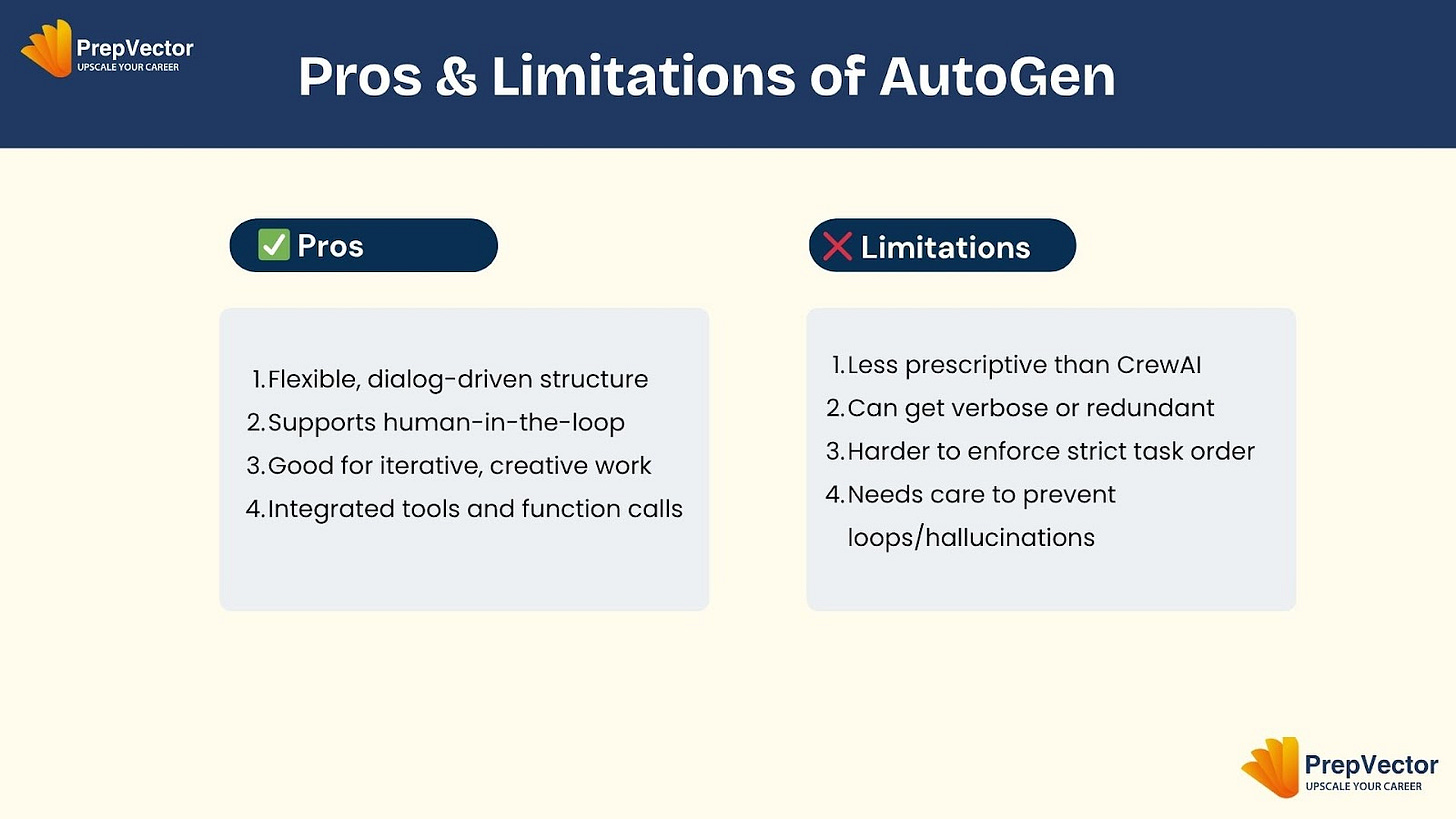AutoGen Unpacked: Conversational Multi-Agent Collaboration for AI Workflows - Part 3
In Part 3 of the AutoGen series, we dive into how multiple AI agents can collaborate seamlessly through structured conversation.
👋 Hey! This is Manisha Arora from PrepVector. Welcome to the Tech Growth Series, a newsletter that aims to bridge the gap between academic knowledge and practical aspects of data science. My goal is to simplify complicated data concepts, share my perspectives on the latest trends, and share my learnings from building and leading data teams.
In our last blog, we explored how CrewAI lets you design structured, role-based teams of agents working toward a shared goal.
This time, we’ll look at another powerful — and more flexible — framework: AutoGen by Microsoft.
AutoGen emphasizes multi-agent conversations, enabling you to build dynamic agent groups that can talk to each other, reason collectively, and solve complex tasks in an adaptive manner.
What is AutoGen?
AutoGen is an open-source Python framework by Microsoft that enables LLM-based multi-agent conversations. It supports:
Autonomous and human-in-the-loop agents
Tool usage (functions/APIs)
Role-driven collaboration
Memory and state management
At its core, AutoGen enables you to define agents with personas and let them talk to each other (or you) via structured dialogue to solve tasks.
Think of it like building a Slack group of AI agents, where each agent has a purpose and speaks in turn to advance a shared objective.
Why Choose AutoGen?
✅ Flexible conversation-driven coordination
✅ Supports both human and LLM agents
✅ Great for research, brainstorming, and open-ended tasks
✅ Customizable message routing & tool calling
❗ Better for dynamic flows than strict pipelines
AutoGen works especially well when:
The task is ambiguous or iterative
Multiple opinions or refinement cycles are helpful
Agents need to challenge or verify each other
Core Concepts in AutoGen
👤 Agents
Each agent has:
A name
A role/persona
A LLM configuration
Optional tools, functions, or memory
Optional human interactivity
Types include:
AssistantAgent – powered by LLMs
UserProxyAgent – allows human input
GroupChat – supports chat-like communication among agents
Conversational Orchestration
Agents interact through structured messages. One speaks at a time, and each response is handled by the designated receiver(s), with AutoGen managing the flow.
You can:
Configure GroupChat rules (e.g., who replies when)
Set termination criteria
Log and monitor all interactions
🔧 Tool Use
Agents can call Python functions, external APIs, or even search engines, similar to CrewAI or LangChain. Tool calls are embedded within responses and executed dynamically.
Shameless plugs:
Master Product Sense and AB Testing, and learn to use statistical methods to drive product growth. I focus on inculcating a problem-solving mindset, and application of data-driven strategies, including A/B Testing, ML, and Causal Inference, to drive product growth.
AI/ML Projects for Data Professionals
Gain hands-on experience and build a portfolio of industry AI/ML projects. Scope ML Projects, get stakeholder buy-in, and execute the workflow from data exploration to model deployment. You will learn to use coding best practices to solve end-to-end AI and ML Projects to showcase to the employer or clients.
How to Build with AutoGen (Example)
1. Install AutoGen
pip install pyautogen2. Define Agents
from autogen import AssistantAgent, UserProxyAgent
assistant = AssistantAgent(name="Assistant", llm_config={"model": "gpt-4"})
user_proxy = UserProxyAgent(name="User", human_input_mode="TERMINATE")3. Start the Conversation
user_proxy.initiate_chat(assistant, message="Generate a business plan for an AI tutoring app.")
That’s it! The agents will exchange messages until the task completes.
You can expand this to:
Add more agents
Add function tools
Log conversations
Control behavior via settings
🧪 Example Use Cases
AutoGen shines in these domains:
Research brainstorming
Researcher ↔ Critic ↔ SynthesizerCo-creation & refinement
Coder ↔ Code Reviewer ↔ TesterTeaching/tutoring assistants
Explainer ↔ Quiz Maker ↔ Feedback Bot🧠 Decision support systems
Options Generator ↔ Evaluator ↔ Strategist
💡 Design Tips for AutoGen
💬 Design clear personas — Be specific in agent roles to reduce ambiguity
🔁 Use GroupChat selectively — Only add agents that truly need to interact
🧪 Test conversations iteratively — Observe chat logs to refine flows
🧩 Combine with tools/memory — Adds depth to reasoning and real-world interaction
📚 Summary
AutoGen opens up a powerful way to build multi-agent conversations that feel natural, adaptive, and capable of open-ended reasoning. Where CrewAI excels at structured execution, AutoGen is perfect for collaborative thinking.
👉 Coming Up Next: While AutoGen offers flexible, conversation-driven collaboration between agents, some tasks demand more structured, stateful execution — including loops, retries, and conditional logic. In the next post, we’ll explore LangGraph, a powerful extension of LangChain that brings graph-based control flow to agentic systems. If you're ready to move from free-form chats to fully engineered workflows, you won’t want to miss it.
Upcoming Courses:
Master Product Sense and AB Testing, and learn to use statistical methods to drive product growth. I focus on inculcating a problem-solving mindset, and application of data-driven strategies, including A/B Testing, ML, and Causal Inference, to drive product growth.
AI/ML Projects for Data Professionals
Gain hands-on experience and build a portfolio of industry AI/ML projects. Scope ML Projects, get stakeholder buy-in, and execute the workflow from data exploration to model deployment. You will learn to use coding best practices to solve end-to-end AI/ML Projects to showcase to the employer or clients.
Not sure which course aligns with your goals? Send me a message on LinkedIn with your background and aspirations, and I'll help you find the best fit for your journey.





